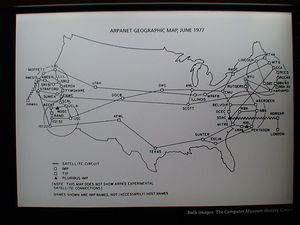ARPANET: Difference between revisions
From ETHW
No edit summary |
No edit summary |
||
| (2 intermediate revisions by 2 users not shown) | |||
| Line 1: | Line 1: | ||
<p>'''''This article is a stub. You can help the GHN by expanding it.''''' </p> | <p>'''''This article is a stub. You can help the GHN by expanding it.''''' </p> | ||
<p>[[Image:ARAPNET1977.jpg|thumb|left]]</p> | <p>[[Image:ARAPNET1977.jpg|thumb|left|Photo by Rory Finneren]]</p> | ||
<p>United States. In January 1969 ARPA awarded a contract to Bolt, [[Leo Beranek | <p>United States. In January 1969 ARPA awarded a contract to Bolt, [[Oral-History:Leo Beranek (1996)|Beranek]] and Newman (BBN) to design and construct a communications network. By the end of 1969, an experimental ARPANET was operational between four university nodes. The idea is based on Lawrence G. Roberts' 1966 publication, "Towards a Cooperative Network of Time-Shared Computers." </p> | ||
Revision as of 14:54, 5 January 2012
This article is a stub. You can help the GHN by expanding it.
United States. In January 1969 ARPA awarded a contract to Bolt, Beranek and Newman (BBN) to design and construct a communications network. By the end of 1969, an experimental ARPANET was operational between four university nodes. The idea is based on Lawrence G. Roberts' 1966 publication, "Towards a Cooperative Network of Time-Shared Computers."
